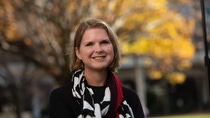From mentee to mentor: If you don’t see it, you can’t be it

As the National Commercial Manager Agriculture Solutions – Australia for multinational BASF, Rachel Carson spends a lot of time talking to farmers.
Rachel, who is based in Victoria believes highlighting the role of rural women, both in Australia and abroad is long overdue.
“It’s really timely we recognise the grit and resilience of these rural women, their work and how highly influential they are within their own communities and the many hats they wear both on and off farm,” said Rachel.
Canadian by birth, and now an Australian citizen Rachel along with her husband left Canada eight years ago in search of a better life and found her calling in Australian agriculture.
“We were both working in Australia and the opportunities were so great, we stayed,” said Rachel.
Armed with an undergraduate degree in crop science and two master’s degrees; one in crop soil and the other in molecular biology and plant science, Rachel admits she has that rare trait of being able to make science easy to understand.
“I really enjoy bringing science to farmers and breaking down scientific principles, so they understand the biological system in which their business operates,” said Rachel.
“Farmers want to know how to get more out of the land and what practices will impact on what they produce and ultimately get to market.”
“I am normally out visiting farmers, talking to them and understanding their needs and we also talk a lot about the weather.”
Are leaders born or made?
Leaders are made, not born according to Rachel because to be a leader you need a “growth mindset” not a fixed one.
Motivated by a desire to expand her circles and meet more stakeholders in agriculture, she is being mentored by former AgriFutures Australia Director, Ric Clark as part of the National Farmer’s Federation (NFF) Diversity in Agricultural Leadership Program (DiALP). The program is an industry commitment to developing more women into key-decision making roles with an ambition to shape the future of Australia’s food and fibre industry.
The NFF recently released statistics that show while 41% of the Australian agriculture workforce is women, only 18% are in management roles and 2.3% are in CEO positions.
Rachel has nothing but praise for Ric who is an information and communications technology (ICT) leader who has spent his career building bridges between industry, research and application on a world stage.
“Ric has given me insights into how to navigate complex matrix organisations and how to succeed in this competitive environment,” said Rachel.
“We’ve also had many conversations around why women are not given the same support networks as men and even though the dynamics are changing, it has been so rewarding to benefit from Ric’s wisdom.”
They’ve also discussed the importance of being on a board and or an advisory panel in agriculture.
Networking outside of your bubble
Rachel believes if you can see women taking up new roles, change is more likely to occur.
“Networking needs to happen outside of one’s bubble so there is broader support for women and a lot of attention needs to be paid to diversity and supporting diversity through sponsorships.”
Rachel is now a mentor in the NFF’s DiALP.
“Diversity is key to changing the role women have, whether that is in the board room or in the field,” said Rachel.
“We need to ensure women are given the same leadership opportunities as men, their projects teams are well equipped, and those teams are made up of a range of different people, with entirely different skillsets.”
The driving force
Bringing out the best in people is part of Rachel’s leadership style.
“There is something so satisfying in helping others and examining new concepts and helping a team understand and incorporate new things,” said Rachel.
“I am firmly of the belief that if I can go from being a trial agronomist to a corporate leader, so can others.”
Adding: “There’s never been a better time to mentor and support other women.”
This article was written by AgriFutures Australia and reproduced with permission.